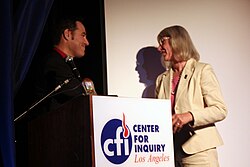| Year | Award | Awarded by | Description |
|---|
| 1998 | Isaac Asimov Science Award | American Humanist Association | Given to recognize specific accomplishments that advance humanism [38] |
| 1999 | Bruce Alberts Award for Excellence in Science Education | American Society for Cell Biology | Awarded to an individual who has demonstrated innovative and sustained contributions to science education, with particular emphasis on the broad local, regional, and/or national impact [39] |
| 1999 | First Amendment Award | Hugh Hefner Foundation | Recognizes the efforts of an individual in defending the First Amendment [40] |
| 2001 | Public Service Award | Geological Society of America | Presented in honor of Gene and Carolyn Shoemaker, whose scientific work and generosity in sharing it inspired and stimulated the public's curiosity about the universe around them [41] |
| 2002 | AIBS Outstanding Service Award | American Institute of Biological Sciences | Given annually in recognition of an individual's and organization's noteworthy service to the biological sciences, especially integrative and organismal biology [42] |
| 2002 | National Science Board Public Service Award | National Science Board | The award recognizes outstanding contributions in communicating, promoting, or helping to develop broad public policy in science and engineering (Note: The Award has since been renamed the NSB Science and Society Award) [43] |
| 2002 | Margaret Nicholson Distinguished Service Award | California Science Teachers Association | CSTA's highest honor, the citation commemorates Scott "in recognition of your many contributions to science education, your leadership and service, and your positive impact on the quality of science teaching in California." [44] |
| 2006 | Anthropology in the Media Award | American Anthropological Association | Honors those who have raised public awareness of anthropology and have had a broad and sustained public impact at local, national, and international levels [45] |
| 2007 | Outstanding Educator's Award | Exploratorium Museum | Recognizing Scott's work in science education [46] |
| 2007 | Scientific Freedom and Responsibility Award | The American Association for the Advancement of Science | Honors scientists and engineers whose exemplary actions, often taken at significant personal cost, have served to foster scientific freedom and responsibility [47] |
| 2009 | The Stephen J Gould Prize | Society for the Study of Evolution | Recognizes "individuals whose sustained and exemplary efforts have advanced public understanding of evolutionary science and its importance in biology, education, and everyday life in the spirit of Stephen Jay Gould." [48] |
| 2009 | The Fellows Medal | California Academy of Sciences. | Awarded in recognition of a recipient's notable contributions to one or more of the natural sciences [49] |
| 2010 | The Public Welfare Medal | U.S. National Academy of Sciences | "For championing the teaching of evolution in the United States and for providing leadership to the National Center for Science Education." [50] |
| 2012 | The Richard Dawkins Award | Atheist Alliance of America | Awarded to individuals it judges to have raised the public consciousness of atheism [51] |
| 2014 | Lifetime Achievement Award | American Humanist Association | Recognizes the accomplishments and work of the individuals reflecting humanist values up to the date of the award and in concert with the prevailing humanist thought of the time [52] |
| 2014 | James Randi Award for Skepticism in the Public Interest | James Randi Educational Foundation | Award in recognition of Scott's outstanding achievements as an advocate for scientific skepticism and her promotion of science education [53] |
| 2018 | The Pojeta Award | Paleontological Society | The award recognizes "exceptional professional or public service by individuals or groups in the field of paleontology above and beyond that of existing formal roles or responsibilities" [54] |
| 2019 | Fellow for the German Skeptic group | Gesellschaft zur wissenschaftlichen Untersuchung von Parawissenschaften [English translation: Society for the Scientific Investigation of Parasciences] | Given to those who uphold scientific skepticism [55] |
| 2022 | Lifetime Achievement Award | California Freethought Day Committee | "Under her leadership, NCSE fought against 'intelligent design' and climate change denial in public schools." [56] |


